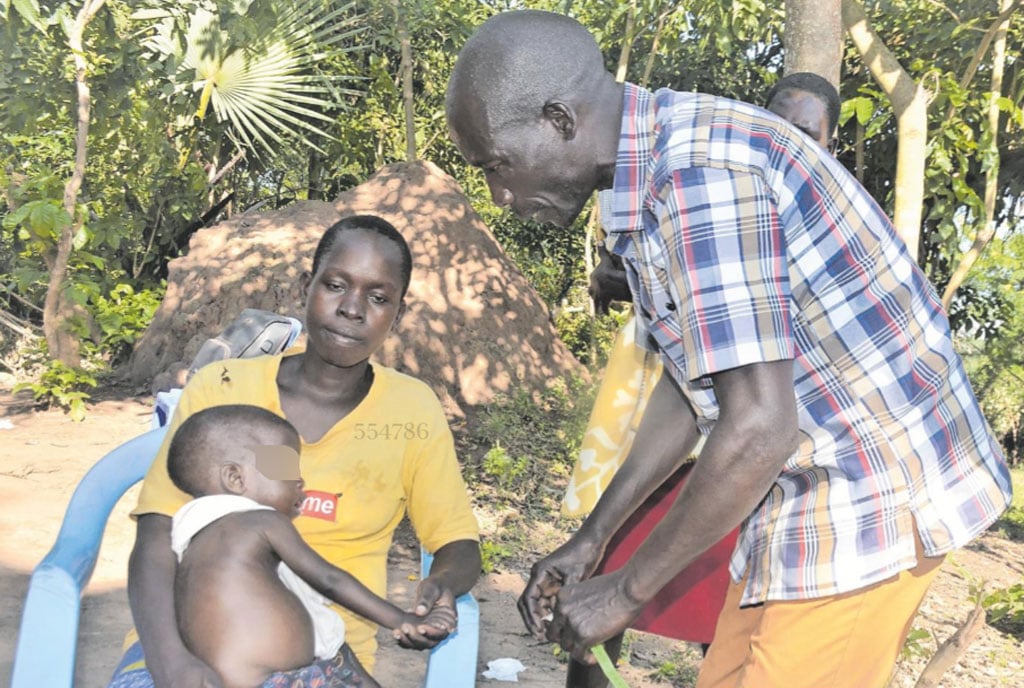
Tororo Woman MP Sarah Opendi speaks during plenary at Parliament on May 16, 2023. PHOTO/DAVID LUBOWA
Out of the 106 clauses, 16 are devoted to remedy major ills spouses typically suffer before, during and after marriages are contracted.
There was an uproar on April 25 when Justice Alice Komuhangi ruled that Ms Peace Uhiriwe be only awarded curtains and a cow after her marriage to Mr Paul Kagwa spanning 18 years ended in dissolution.
Ms Uhiriwe had filed for divorce, citing extramarital affairs on the part of her erstwhile husband.
Whereas the Family Division of the High Court in Kampala acknowledged the said marriage contracted on December 16, 2005 was legal, Ms Uhiriwe’s plea to split major prime properties attained and/or developed while together was not upheld.
The court reasoned that the said developments, which included a livestock farm, were registered in the name of Mr Kagwa.
ALSO READ: How new marriage Bill will affect you
In another ruling delivered on January 19, 2023, the Court ordered Ms Fortunate Kyarikunda to pay her former fiancé, Mr Richard Tumwine, Shs10 million in compensation for breaching a promise to marry him upon completion of her Diploma in Law at the Law Development Centre (LDC).
Before delivering the verdict, the court had heard that Mr Tumwine had bankrolled Ms Kyarikunda's studies at LDC and conditioned that the two would eventually get married upon her graduation. Ms Kyarikunda, however, later changed her mind.
Righting wrongs?
The contrasting outcomes of the two aforementioned cases, in part, explains why Ms Sarah Opendi took a leave of absence from Parliament to stitch together the Marriage Bill, 2024.
The Bill that the Tororo District Woman Representative tabled nearly a month ago sets out to “reform, repeal and consolidate the legal framework governing marriage in Uganda”.
It also purposed “to provide for recognised marriages in Uganda, registration of marriage, marital rights and obligations, conversion from one form of marriage to another form of marriage, property rights, separation and dissolution of marriage, among others”.
Out of the 106 clauses, 16 are devoted to remedy major ills spouses typically suffer before, during and after marriages are contracted. For instance, clause 49 provides for equal access to property.
“Spouses shall be entitled to equal access to matrimonial property,” the Bill reads in part, adding that “equal access includes the right to use, occupy, benefit from, enter the property and to dispose of the property unless there is an agreement between the spouses to the contrary.”
Clause 45 of the Bill defines the kinds of property to include in a matrimonial home. It also interests itself in household property as well as the “seed funding provided by a spouse for the establishment of a business”.
Property ground rules
The Bill as well moves to state ground rules for assessing property. It consequently establishes two types of property.
Firstly, “any other property either immovable or movable acquired before or during the subsistence of a marriage, deemed to be matrimonial property by express agreement of the parties to the marriage” and, secondly, “property which was individual property but which a spouse has made a contribution towards, except where the property relates to the sale of family land.”
It doesn’t stop at that. Additionally, clause 54 underscores that “where a spouse gifts property to the other spouse during the subsistence of a marriage, there is a rebuttable presumption that the property belongs to the receiving spouse”.
ALSO READ: Marriage Bill: 'We are tackling reality'
The same draft law conditions in clause 55 that a debt attained by one of the spouses shall be shared, hence becomes liability to be settled by both parties.
“Where during the subsistence of a marriage, a debt is incurred for the necessities of life for the immediate family; (a) with the consent of the other spouse, the debt shall become a family liability to be borne by both spouses equally; or (b) without the consent of the other spouse, the debt shall be borne by the spouse who incurred the debt, unless agreed otherwise by the spouses,” the Bill reads in part.
Children safety net
Ms Opendi has drafted clause 61 to protect children born by spouses who are formally married by having the property of such two persons be used to determine the weight of the award given to such children.
“The court shall, upon application by either a man or a woman, presume a marriage under this Act, for purposes of determination of maintenance of children and property rights accruing to the parties from a relationship,” the Bill states.
It immediately emphasises that “for the avoidance of doubt, the relationship under this part shall not be categorised as a marriage under this Act.”
In so doing, the Bill says: “The court, in determining the rights of a child under subsection (1), shall follow the principle of the best interest of a child under the Children Act.”
The same Bill dictates that a court order should be obtained prior to carrying out Deoxyribonucleic Acid (DNA) test on any child.
“There shall be a rebuttable presumption that a child born during the subsistence of a marriage is the biological child of the parties to the marriage,” clause 44 of the Bill reads in part, adding, “a person shall not subject a child born during the subsistence of a marriage to Deoxyribonucleic Acid (DNA) testing without an order of court.”
Penalties
Tough penalties are prescribed against persons who knowingly violate or intentionally join a marriage institution with ill-motives.
For instance, the Bill provides that “a person who falsely claims or asserts that he or she is married to a particular person commits an offence known as "jactitation of marriage" and “is liable on conviction to a fine of Shs10 million or serve three-year jail term or even both.”
In the specific terms, “holding out under this part means living together as husband and wife, acquiring or owning property jointly, bearing children together, and taking on the man’s surname by the woman.”

In similar terms, the Bill states that “a person who knowingly undergoes a ceremony of marriage, with another person in a subsisting monogamous marriage, commits an offence” that attracts a Shs10 million fine or be imprisoned for five years or can even serve both punishments.
The same punishment is suggested for anyone who impedes marriage from occurring between two persons intending to get married.
Similarly, a Shs10 million fine or five-year jail term is prescribed for individuals who impersonate others by for instance marrying on behalf of their brothers or sisters who may either be physically distant or for other reasons fail to attend marriage.
“A person who impersonates another for the celebration, in the course of marriage, or marries under a false name or description with intent to deceive the other party to the marriage commits an offence,” the Bill reads in part.
Any “person who aids, abets or performs a void marriage,” risks paying a Shs10 million fine or serving 10 years in prison or even both punishments, while persons that marry children will be sentenced to 10 years in prison.
CSOS speak out
Stakeholders within the Stand for Her Land Campaign in Uganda (S4HL) in coordination with Uganda Community Based Association for Women and Children’s Welfare (UCOBAC) largely endorse the provisions of the draft law.
Ms Jordana Wamboga, the programme officer at UCOBAC, told Monitor that the Bill will be pivotal in “curing many issues that people at the grassroots but also in the urban areas face, especially issues regarding the property rights and also matters that affect children plus marriage generally”.
“There were so many cases of property being sold without the consent of the wife and in many cases the men will tell you that she is not my wife because their marriage is not properly defined. So with this Bill, it puts into consideration the interests of children regardless of whether the marriage has been defined,” Ms Wamboga added.
As the Bill awaits processing by Parliament, Ms Wamboga revealed that her organisation together with counterparts with similar interests have embarked on popularising available legislations in the Successions Act and Children’s Act that protect women and children.
Once enacted, Ms Wamboga believes that the legislation will “help us educate the men to shift from that mindset of looking at women as people who have come to snatch their property to people who are supporters and are going to help them to be able to advance their families in a positive direction.”




